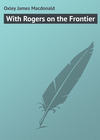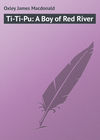Читать книгу: «With Rogers on the Frontier», страница 11
CHAPTER XXI
AN EASY TRIUMPH
Had the neighborhood of Fort Duquesne been overrun with scouts as was that of Ticonderoga, the presence of Seth's party could hardly have remained unknown, but there was not at all the same vigilance exercised, and consequently the venturesome intruders upon hostile ground were able to make their way unchallenged to an eminence afterward called Grant's Hill, where, well hidden by trees and bushes, they could look right down upon the fort.
Now the Indians had been reporting to the English commander that the French were very strong, in fact that their numbers quite equalled if they did not surpass his, but after Seth had scrutinized the place he exclaimed:
"Those rascally Indians have been lying, as usual. The French are nothing like as strong as we are. If our men were only here now we could take the fort easily. What a pity they're not! And at the rate they're getting ahead they won't be here for months. If only Colonel Washington had his way things would be different. But it's the old story. I'm sick of the slow way they have of doing things."
He had good reason to feel impatient. The work of road-making through the dense forest was exceedingly heavy and tedious. Over the main range of the Alleganies, hewing, digging, blasting, laying fascines and gabions to support the track along the sides of steep declivities, or worming their way like moles through the jungle of swamp and forest, the soldiers toiled at their tremendous task while the weeks went by, whereas if the Braddock route had been followed their progress would have been comparatively rapid.
Not satisfied with having got a very good idea of the French fortress and of the strength of its garrison, Seth had it in mind to take back with him a prisoner or two, as Major Rogers was wont to do whenever possible, and so, instead of setting out at once on the return journey, he moved from the hill and lay in ambush by the road leading northward from the fort.
"We mustn't be in a hurry to let our presence be known," he told his men. "If the French get the alarm we may be cut off and captured. So we'll keep as quiet as possible until we see a good chance of taking a prisoner."
They had not long to wait, for that same afternoon appeared a small party of soldiers sent out by the Commandant de Leignerie to see if there were any signs of the approach of the reinforcements and provisions which he expected from Canada, and which were now overdue.
They were in a gay mood, joking and laughing with each other, being evidently well pleased at getting away from the confinement of the fort for a little outing.
"Let them go on a bit," whispered Seth to his men waiting for the signal to rush upon the unsuspecting soldiers. "The farther they are from the fort the better. We'll follow them close."
Not until they had gone another mile was the command given, and then the Rangers dashed out of the woods upon the startled Frenchmen with such suddenness that they had not time to lift their guns to their shoulders, and were easily made prisoners, with one exception.
This was the officer in charge of them, a stalwart youth with a sinister countenance, who whipped out his sword at the first alarm, and made a slash at Seth that would have cleft his skull, had he not cleverly parried it with the barrel of his musket.
Before the Frenchman could recover himself for another stroke Seth drove the muzzle of his musket into his ribs, knocking the wind out of him so that he went down in a heap on the road, groaning with pain.
If Seth's object had been to kill, the whole party might have been despatched without difficulty, but it was not in his heart to take their lives when they were at his mercy. Even the officer who had come pretty near putting an end to him he had no thought of doing away with.
Yet now that he had the prisoners he was in a considerable quandary as to their disposition, for they were too many to take them all back with him, while if he set some of them free they would of course make all haste back to the fort and rouse the garrison to pursuit.
After puzzling over the problem for some minutes he saw no other way out of the difficulty than to adopt the expedient of releasing all but two of the soldiers, on their taking oath not to return to the fort for twenty-four hours, which would allow the Rangers ample time to get beyond all possibility of pursuit.
The two prisoners he retained were the officer and one of the soldiers, with whom he now hastened back, feeling, as he well might, well satisfied with the success of his enterprise.
The officer proved sulkily silent, and no information could be extracted from him, but the soldier made amends by being very communicative, and freely answering Seth's questions, whereby it was made clear that Fort Duquesne would prove an easy conquest if the attack upon it could only be made promptly.
When Colonel Washington heard this, he was all the more put out that his advice in regard to the route had not been adopted.
"It is really too bad," he said, his troubled countenance showing how deep was his concern, "that Brigadier Forbes should have been persuaded to take the longest way to the fort. But it is too late now to change the plan. We must only carry it out as best we can. I am sure that when he hears your report he will feel bound to admit that my counsel should have been followed."
Seth had by this time come to have such an admiration for Washington that he was ready to accept unquestioningly any opinion he might hold, and it made him quite wrathy to think that the views of so able a leader should not prevail.
He showed this spirit so plainly in presenting his report as to bring upon himself a sharp rebuke from the commander-in-chief, who, being a somewhat testy Scotchman with a good opinion of himself, did not take kindly to having his wisdom questioned by a mere youth.
"You presume too much, young sir," he said, in a tone of manifest irritation. "Your business is simply to give an accurate report of what you had ascertained. You have nothing to do with what we may see fit to determine upon."
Seth flushed deeply, and was tempted to retort that when what he had learned went to show so plainly that no time should be lost he felt bound to say so, but his better sense prevailed, and he accepted the reproof in silence.
Thenceforward the tedious work of piercing the wilderness went steadily on, but it was well into November ere the English force had got near enough to Fort Duquesne to prepare for striking the first blow.
Washington had opened the way by cutting a road to within a day's march of the fort, and in order that the advance might be as rapid as possible, no artillery save a few light pieces was taken.
On the evening of the twenty-fourth of November the English force, which consisted of twenty-five hundred picked men without tents or baggage, and carrying only knapsacks and blankets, encamped by Turkey Creek in readiness to attempt the attack on the following day.
Brigadier Forbes, although suffering so from sickness that he had to be carried on a litter, was in command, and with him were Colonels Washington, Bouquet, and Montgomery, while the detachment was made up of Royal Americans, Highlanders, and Provincial troops.
Their progress had hitherto been unopposed, but this was no guarantee that they might not find the French blocking their way.
About midnight the camp was aroused by the sound of a heavy explosion that came booming over the western woods.
What could it mean? Had a magazine exploded by accident at the fort, or was it possible that the French were blowing up their works in despair of being able to defend them?
Seth determined that he would lose no time in finding out, and by break of day he was off with his Rangers at a pace they only could maintain through the leafless forest until they came out upon the open plain in which stood Fort Duquesne.
"Deserted and destroyed, as I live!" Seth cried as with one swift glance he took in the state of affairs. "Not a Frenchman left and the whole place in ruins. Well, I declare, and what will our folks think of it? I shouldn't wonder if they'll be not a little disappointed."
There was not a sign of life about the place, and after a hasty examination of the premises Seth, leaving most of his men on guard in case some of the Indians should attempt to loot the place, made all haste back to the main body.
Half way thither he met Colonel Washington at the head of his regiment of Provincials, and told him what had taken place.
"I am not at all surprised," he said in his calm way. "In fact I should have been more surprised had the French made any defence, but I am sorry that they have destroyed the fort, as it would have been useful to us in the future. However, there's no helping it now. You again have the pleasure to be the bearer of good news, Ensign Allen. I trust it may always be your fortune."
Seth thanked him for his kind words, and continued on his way until he came to the litter of the suffering General, to whom he reported what he had seen.
"Ah, ha!" he exclaimed, "and so they have run off like curs after first blowing up the fort. Drat them, I wish they had stayed long enough to let us have a crack at them. They owe us a long score which now we'll have no chance to make them pay. Tut, tut, it's very provoking," and so he went on, fully confirming Seth's shrewd anticipation.
The work of destruction was so complete, the barracks and storehouses being burned to the ground, and the fortifications blown up, that the victors could make no use of what was left, and to provide defence and shelter for those of their number on whom the dangerous task was to fall of keeping what had been won, were compelled to plant a stockade around a cluster of traders' cabins and soldiers' huts which had been left intact.
This temporary apology for a fort Forbes called Pittsburg, in honor of the Prime Minister, William Pitt, and it was the germ of the great city of the present day.
A small garrison of Provincial troops having been left to hold Pittsburg for the winter, the remainder of the force returned to Philadelphia, having achieved a solid, if not brilliant, success, for the conquest of Fort Duquesne opened the Great West to English enterprise, took from France one-half of her savage allies, and relieved the western borders of the provinces from the awful scourge of Indian war, so that from Southern New York to North Carolina the frontier people had good reason to bless the names of the steadfast and much enduring soldier, Brigadier Forbes, and his loyal assistants, Colonels Washington and Bouquet.
Seeing no prospect of further service there in the near future, Seth with his Rangers went back to Fort Edward, where they found Major Rogers and the rest of the men at their old work, but impatiently looking forward to an active and eventful campaign when the winter had passed away.
Seth's greeting from his chief could not have been more cordial.
"I am right glad to see you back, my boy," he exclaimed as he gave a warm grasp of the hand, "and I'm curious to hear all about your doings down South. I hope you kept up the credit of the Rangers."
"I'll leave you to judge of that after you've heard what I have to tell," Seth responded archly, and then he proceeded to give an account of his experiences.
The Major listened with lively interest, asking many a question, and making frequent comments. He evidently enjoyed the recital until Seth came to speak about Colonel Washington, and then his ardent admiration for the Virginia officer seemed to displease him, and he broke in with:
"What makes you think so much of that man? What great things has he done, any way?"
Seth, not perceiving that the question was prompted by a spirit of jealousy which he had roused, for Major Rogers was one who could not brook a divided allegiance, made haste to take Washington's part, and before he realized it found himself involved in a controversy that threatened to grow uncomfortably warm, so for fear of giving offence to his friend he ceased arguing the matter, and started off on another track.
But his eyes were opened, and he took care not to mention the name of Washington to the Major again.
A few days after his return he received the gratifying news of his promotion to the rank of lieutenant, which made him very happy, and all the more eager for the renewal of active hostilities in order that he might have the opportunity of achieving further advance, for it was the ambition of his heart to become a captain, and have command of a troop of Rangers.
While he was away on the Fort Duquesne expedition General Abercrombie had made a futile attempt to take Ticonderoga, and had then withdrawn his forces and gone into winter quarters. The French at the other end of the lake had done the same, and only an occasional scouting party kept alive the embers of war.
Montcalm, who commanded the French, from time to time sent out war parties to harass his opponents, and one of them under La Carne succeeded in surprising and destroying a large wagon train.
When General Abercrombie heard of it he ordered Major Rogers to take a strong party of Rangers and Provincials, and to go in pursuit of the enemy. As a matter of course Seth went with him.
CHAPTER XXII
AT CLOSE GRIPS WITH DEATH
Major Rogers' force on this occasion was the largest he had thus far commanded, comprising as it did a big body of Connecticut men, and a small detachment of regulars, chiefly light infantry, bringing the total up to seven hundred in all.
They marched through the forest to where Whitehall now stands, and thence made their way up Wood Creek to old Fort Anne, long abandoned and falling into decay. Here in the already overgrown clearing that surrounded the ruin they encamped.
Up to this time Rogers had observed his usual caution, commanding silence on the march, and forbidding fires at night, but having discovered no signs of the enemy, and led into over-confidence, perhaps, by the unusual strength of his party, he was rash enough to accept a wager with one of the officers of the light infantry as to which was the best marksman, and the following morning was set for the trial of skill.
When Seth learned of this he was much troubled, for although he had not come upon any trace of the enemy, he somehow had a conviction that they were not far away, and he ventured to suggest to his chief that it might not be wise to have musket firing until the neighborhood had been more thoroughly examined.
But the Major took his remonstrance amiss.
"When I wish your advice I will ask you for it, young man," he said, with an asperity of tone that made Seth's countenance redden. "I am quite sure there are no French or Indians within cannon sound of us, so you need give yourself no concern about what I propose to do."
Seth knew that it was vain to argue the matter, and said no more, although the foreboding of approaching disaster grew stronger through the night.
Soon after daylight the shooting match took place, and Major Rogers proved an easy victor, but the triumph, which evidently gave him great satisfaction, was obtained at a fearful cost, for the sound of the shots reached the ears of a large band of French and Indians under command of the famous partisan Marin, who at once took steps to reconnoitre and ambuscade his reckless enemy.
All around the old fort the forest had formerly been cut down and burned, but during the long years of neglect the opening thus made became overgrown with bushes and saplings so densely as to be impassable save where a narrow Indian path traversed it.
Along this path Major Rogers and his men were forced to march in single file, and so soon as the shooting contest was settled they slung their packs and set out.
The Connecticut men were in the lead, then came the regulars, and the Rangers brought up the rear.
Never in his life before had Seth felt so depressed in spirits, although he could in no wise account to himself for it.
"I'm sure there's trouble coming," he said to the Ranger who walked next him. "I do wish they hadn't been firing at the mark. The sound of their guns will go far this still morning."
The words had hardly left his lips when the noise of rapid firing came over the tops of the bushes, and he exclaimed excitedly:
"I knew it! I knew it! The French have ambushed us. Quick now to the front!"
And he dashed off through the brushwood, followed by his men. They had, of course, great difficulty in making their way, although the yells of Indians mingling with the reports of the muskets made clear to them that Seth's surmise as to what had taken place was correct, and they were wild to get to the assistance of their imperilled comrades.
What had happened was this: When the head of the line emerged from the tangled shrubbery, and was about to enter the forest there broke forth a horrid chorus of savage yells, and suddenly the place became alive with Indians.
One of them, a huge Caughnawaga chief, with uplifted hatchet sprang at the foremost of the English, who threw up his gun, and pulled trigger. But unhappily it missed fire, and the next moment he fell with cloven skull.
Then the firing began. The French and the Indians, lying across the path in a semicircle, had the double advantage of surprise and of position, and the Connecticut men at first fell back among the bushes in disorder, but presently rallied, and held their opponents in check until the regulars and Rangers could force their way through the thickets to their support.
So dense was the brushwood that it was only after much loss of time and with great difficulty that the English were able to assume some kind of order in front of the enemy, and even then each man was forced to fight for himself as best he could.
The fulfilment of his foreboding cast no spell over Seth's courage. He plunged into the conflict as though he bore a charmed life, and many an Indian fell at the crack of his gun.
Yet with the wisdom of the true woodsman he did not expose himself unnecessarily, but took advantage to the utmost of such cover as their position afforded.
The fusillade continued for nearly two hours with heavy loss on both sides, but without the combatants coming to close quarters, as the French evidently feared a hand-to-hand struggle, and the English leaders, having no idea of the actual strength of their assailants, did not deem it prudent to attempt to charge upon them.
The fierce and bloody conflict was at its height when Seth, moving forward to get a better position for shooting, suddenly found himself face to face with three Indians, who had crept upon him through the underbrush.
His gun was empty, and he had no time to reload it, but he felled one of the savages with the butt, and was about to treat another in the same fashion when the third sprang at him and tripping him cleverly, flung him heavily to the ground, where both threw themselves on him, and pinned him fast.
They were powerful braves, and, although Seth struggled frantically to free himself, they soon had his hands bound with thongs which hurt cruelly, and rendered him helpless.
Then, each seizing an arm, they rushed him to the rear of their own line, where they lashed him to a tree so that he could not move a limb.
All this time Seth had not spoken. He knew how vain was any appeal for mercy, and steeled his heart for the torture that was sure to be his fate.
Having secured him to the tree, his captors, letting the battle take care of itself, proceeded to amuse themselves in characteristic fashion by throwing their tomahawks at Seth's head with the idea of seeing which could come closest to without actually striking their living target.
It was fine fun for the dusky fiends no doubt, but it was a terrible ordeal for Seth, and yet the brave fellow hardly blinked as the cruel steel flashed past his eyes, and buried itself in the tree with a vicious thud, sometimes severing a stray lock of his hair in its flight.
Nor were the redskins the only ones to act thus inhumanly, for when they had wearied of their amusement, a French officer came up, who after assailing the helpless captive with vigorous abuse, thrust the muzzle of his gun violently against his body, pretending to fire it, and then struck him in the face with the butt, inflicting a painful bruise.
Still Seth maintained his stoical silence, for he had determined that although they should tear him to pieces, or burn him with slow fire, they should not extort from him any sign or sound of weakness.
When the retreat began the Indians unloosed Seth from the tree, stripped him of nearly all his clothing, bound his wrists together so tightly that the pain was intense, and then placing upon his bare back as many of the packs of their wounded as could be piled up, they hurried him along until at last in sheer exhaustion he fell to the ground, and could not move despite the blows showered upon him.
He might have been despatched there and then had not a French officer, moved to compassion by his desperate plight, persuaded the Indians to untie his hands, and lighten his crushing burden. They also gave him a pair of moccasins to protect his lacerated feet, from which they had taken his shoes and stockings.
His misery being thus somewhat mitigated, Seth was able to go on and to stagger under his load until his captors encamped for the night.
But cruelly as he had suffered already there was worse yet to come, for, having removed the last vestige of clothing, they tied him to a tree, and set to work to surround him with brushwood.
"Merciful Heaven, they are going to burn me!" he groaned. "If they would only kill me first! How can I stand the terrible torture?"
Nevertheless he nerved himself to bear the awful ordeal, not deigning to utter a cry for mercy.
The savages were evidently impressed by his heroic bearing, and delayed lighting the wood, while they danced about him, brandishing their tomahawks in his face, and trying to make him flinch from their pretended blows.
In the midst of their fiendish frolicking there fell a sudden shower of rain which soaked the wood so that it would not light, and this seemed to offer some hope of a respite for their victim. But no sooner had the rain ceased than the merciless wretches resumed their horrid preparations, and this time succeeded in surrounding him with a circle of brushwood which they set on fire, and then yelled and danced before him in delight at his vain endeavors to avoid the rising flames.
His case certainly seemed desperate to the last degree. Thus far he had held the hope that his tormentors might stop short of taking his life in order to carry him back to Canada as a trophy of their prowess, but when the fire began to scorch his naked limbs he gave himself up to despair.
The flames were climbing to his waist. A few more minutes and it would have been all over with him, when into the midst of the dancing, yelling crowd there burst a stalwart figure shouting in French:
"You red devils, what are you about? How dare you torture one of our prisoners like that and disgrace us all? If I had known what you were about I would have put a stop to it before this."
It was Marin, the Canadian leader of the war party, who, on hearing what was taking place, had with courageous humanity rushed to the scene, determined to interpose at all hazards.
Nor was he content with upbraiding the Indians for their cruelty, but dashed at the blazing brushwood, tore it away from Seth, cut his bonds with a slash of his knife, and dragged him out of danger.
The whole thing was done so quickly and in so dauntless a fashion that the savages were completely taken back, and when Marin, having berated them further, placed Seth under the protection of a Caughnawaga chief, who promised to be responsible for him, they acquiesced in the arrangement without a murmur.
The Caughnawaga accepted the trust reposed in him, and at first seemed disposed to treat Seth kindly, but the means he took to insure the prisoner not attempting his escape, while certainly effective, were by no means considerate of his comfort, seeing that he stretched him on the ground in the form of a St. Andrew's cross with his wrists and ankles fastened to the stems of young trees.
Nor was he satisfied with this, but must needs place brushwood upon his body, and across it long slender saplings on the ends of which several warriors lay down to sleep, so that Seth could not make the slightest movement without rousing them.
The misery of that night may hardly be conceived, since in addition to all the physical suffering, the proud, sensitive nature of the New Englander writhed as he realized what an utterly ludicrous figure he presented.
Next day after a painful march he reached Fort Ticonderoga, and was taken before Montcalm, who asked him a number of questions about the strength of the English forces, and their plans for the future.
But he got little light from Seth, who, thoroughly understanding the purpose of the examination, either evaded the questions, or firmly refused to reply to them, even though the French commander threatened to have him tortured if he did not answer in the way desired.
The end of it was that Montcalm, finding he could elicit nothing from him, ordered him to be sent up to Montreal as a prisoner of war.

















